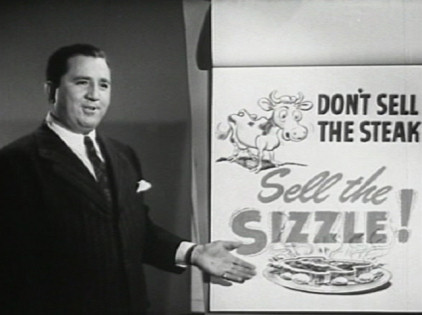In 2014, the Direct Marketing Association invited two generations of copywriters for lunch. They invited the so-called “ad guys” responsible for advertising slogans from the past, and young marketing blood, responsible for filling websites and company social media accounts with content.
The outcome was a film (“Madmen v Mavens”) in which both generations shared their insights on the present condition of copywriting. As you can imagine, the older generation said it’s not the way it used to be and that the younger generation taking care of this digital rubbish (“Social Media . . . there’s hardly any writing in it, is there?”) is talentless. Meanwhile, the younger generation discussed the conditions of copywriting in an era of new media and complained about creativity-constraining briefs, and the necessity of working in a never-ending rush.

Even though they mention a lot of cliches, the discussion as a whole is a great starting point to reflecting on whom a copywriter is, what is their role, and what skills they should have nowadays.
From advertising slogans to media platforms
Not so long ago, copywriters were responsible for advertising slogans, flyer content, and scripts for TV and Radio adverts – the most popular advertising tools. They were responsible for words that sold, bending the language and presenting the biggest number of benefits in the most economical way possible.
Being a copywriter is still associated with inventing advertising claims; however, nowadays content creators ponder a lot less about whether it’s “Miller time” or if “Red Bull gives you wings.” The promotional arsenals of many companies look a lot different. More and more brands create their own media platforms on the internet, where banners and flyers have been taken over by articles, films, and infographics. The latter are elements of an inbound chain, where the key link is obtaining the highest ranks in Google’s search engine, and patiently building the brand’s personality.

Modern users want both to be able to easily find a product or service that will meet their needs and to be able to get closer to the brand that is behind the product/service. They want to get to know it better and identify with it.
Content marketing means responsibility
In an era of content marketing, copywriters (one of the people in the “Madmen v Mavens” discussion rightfully questioned the meaning of the name) are expected to know a lot more than — quoting the famous marketing guru Elmer Wheel — “Don’t sell the steak, sell the sizzle.”

Copywriters play a key role. When creating content for the company blog, they’re responsible for not only the kind of language the company uses with their audience but most importantly— for what it says. This is a huge responsibility, especially nowadays, when a lot of companies step into content marketing without a strategy or plan.
Benefits, tons of adjectives, and keywords added here and there aren’t enough to write an interesting piece that will be both liked by Google’s algorithms and interesting enough for your audience to share and link to your article. And as we know, links are one of the most important ranking factors.
Apart from adequate writing skills, and basic knowledge of SEO optimization, a copywriter should know how to do proper research. They must get to know the niche thoroughly and learn of its relevance to other areas of life, which might interest someone who’s not directly interested in that particular niche.
Copywriter — an internet journalist?
Writing skills, research, and an interdisciplinary approach are the three elements which bring a copywriter’s job closer to a journalist’s job.
Of course, both have a slightly different approach to their texts: a copywriter will always write with a brand in mind, while the journalist has an important civic responsibility. Although this comparison is still being looked at with contempt (some call content marketing a parachute for journalists), more and more people are describing content marketing as a new form of journalism.

There’s a lot of truth in this. Press sales are declining, and young people are giving up on TV and radio, and they are choosing digital media instead. So since traditional media is doing worse and worse, many journalists are looking for a steady job in marketing. At the same time, content posted by brands often becomes news that is caught on by a lot of editorial teams.
Although it’s too early to talk about an internet revolution, it’s worth mentioning a few lessons that might flow from editorial desks to office and bedroom desks (because a lot of copywriters are freelancers).
- Editorial work — writing is one of the last stages of creating content. To form an authentic bond with customers, we must start with patient research and observation of the latest news and trends. This way we will find a topic that hasn’t been covered by anyone yet, but might be important to many readers.
- The courage to reach for difficult topics — content marketing can’t be scared of difficult topics. They stimulate discussion (where links and shares are the fuel), and shape the brand’s personality and character. We can’t post “15 perfect holiday destinations” all the time, slowly turning our platform into a machine that produces generic and boring content.
- Social sensitivity — it should characterize our difficult topics. Amidst chasing the latest news, or viral video, it’s sometimes worth slowing down and looking at our content again from a different perspective. Without this step, we might unintentionally expose our brand to an image crisis, despite not having any malicious intentions. Said situations have recently happened to brands like Tiger and Dove.
- Verifying information — by posting unconfirmed information we might compromise our brand’s image — especially when it’s the main point of our topic (this might easily happen in the era of fake news). Our readers don’t like being lied to, and the thin line between being flooded with hate is usually a few minutes of proof checking our source.
- The reader comes first — this mantra is definitely ringing in many copywriters’ heads today. “Write for your audience, not for the algorithms.” Sure, but what does this really mean? To truly admit that we put our readers first, niftily hiding keywords in the text is not enough. We must consider what they really care about, what they want to read about, and what they haven’t noticed yet, but is right under their noses.
How much for 1000 spaced characters?
Copywriting is stuck in a trap.
The younger generation is right: creating internet content is just a fight against time and brand recommendations that usually don’t want to risk anything, but at the same time anticipate new content in the fastest and cheapest way possible. Good ideas are often confronted with business realities, cutting off copywriters’ wings.

But copywriters are to blame too. A lot of them think that writing skills can substitute “the love for writing” combined with a basic knowledge of SEO optimization. Amongst such competition (with this attitude, anyone could be a copywriter), they pile on jobs, charging next to nothing for them, and filling the internet with boring and repetitive content.
Content is king…with a dusty crown
There is great potential in content marketing, which is one of the most important tools in marketing communication. A carefully and patiently carried out strategy is a chance for both, big and small companies, to create a positive image and increase their turnover. The content provided by the brands shouldn’t just lure in clients, but it should also provide valuable information and entertainment. Last but not least – work in content marketing can be a way for content creators (usually graduates of journalistic courses) to free journalistic potential in these hard times for traditional media.

If content really is king, we should make sure that it has a crown embellished with diamonds. And we should stop allowing dust to settle on it in order for it to reach its fullest and shiniest potential. It’s time to look at the profession of a copywriter from a different perspective.